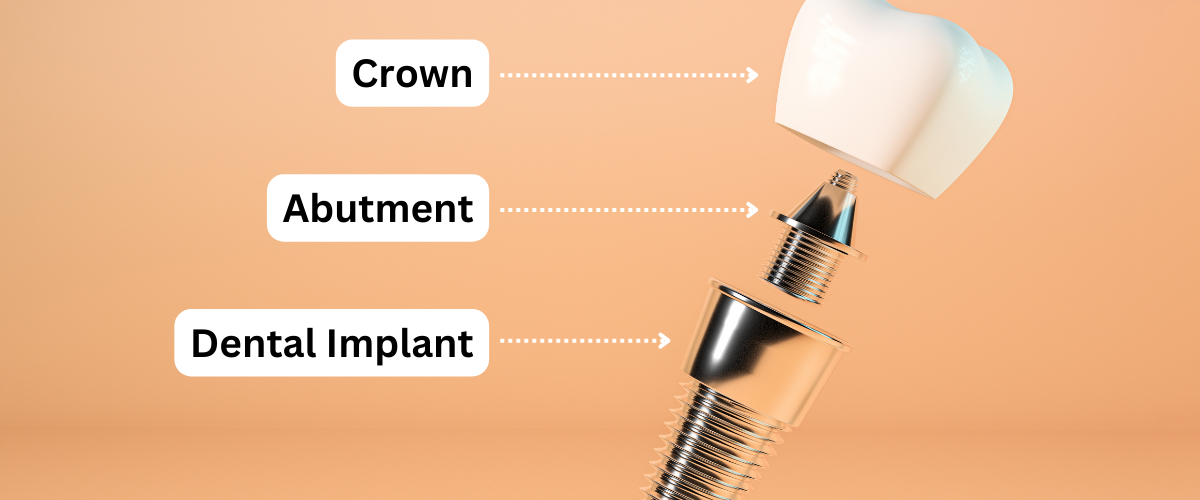(714) 832-8000
12791 Newport Ave #100 Tustin, CA 92780
The Gold Standard To Replacing Missing Teeth
Did you know that an estimated 120 million people in the United States are missing at least one of their teeth? Teeth can be lost in a wide variety of ways: decay/disease, trauma, teeth grinding, genetics, smoking/tobacco, poor nutrition, or various medical conditions. In fact, I’ve had a patient who broke a tooth biting down on soft bread!
Losing a tooth can make you feel self-conscious. There are few things that make you feel more vulnerable than missing a tooth.
But what most people don’t realize is that a missing tooth affects more than just the way your smile looks.

Missing Teeth: More Than Just Looks
Not only does a missing tooth affect the look of your smile, it also carries several significant long-term consequences. Here are several things that happen due to a lost tooth:
- Sunken Facial Structure: When left untreated with no tooth root to stimulate the jawbone, you begin to lose bone underneath the tooth. Over time, this results in a ‘sinking in’ of the lips as the bone begins to resorb away and collapse parts of the facial structure.
- Difficulty Chewing: A missing tooth can compromise your ability to chew up various types of food, leading many to settle for more convenient (and often less healthier) foods
- Teeth Movement: A large gap between your teeth will sometimes result in the shifting of your surrounding teeth. Severe cases can often require orthodontics to correct.
- Jaw Misalignment: Another consequence of a missing tooth is an imbalanced bite, which can lead to abnormal tooth wear, gum recession, and even facial pain & headaches.
- Change in Speech: Each of your teeth influences the way you speak and talk. If one of your teeth is missing, it can affect your speech.
- Reduced Confidence: A noticeable gap in your smile can cause even the best of us to feel self-conscious, making us less confident in ourselves and more likely to hide our teeth.
Missing a tooth might not seem like a big deal. But the long-term consequences can be both big and costly. Even if you are not a good candidate for dental implants, I still strongly recommend other restorative options to prevent any lasting damage to your oral health.

What are Dental Implants?
Essentially, dental implants are like artificial tooth roots. They are engineered to act in a similar way to your natural tooth roots. Made of medical-grade titanium (known for its corrosion resistance, strength, and ability to integrate into your existing bone), dental implants provide the foundation for a brand new, natural-looking tooth.
Because of their durability, aesthetics, and seamless integration, I refer to dental implants as the ‘gold standard’ for replacing missing teeth. For most cases, there is simply nothing better.
How Do Dental Implants Work?
Dental implants are designed to look and act like a natural tooth. What’s different about dental implants compared to other tooth replacement options is that the implant is actually embedded in the gumline, simulating your natural tooth roots, while others sit right on top of the gumline. This is important because by going down into the gumline you stimulate the jawbone and prevent bone recession, teeth movement, and a sunken facial structure.

Three Parts of Dental Implants
It can help to look at dental implants in three parts: the actual implant, the abutment, and the crown. The implant is an artificial tooth root, placed into your gumline right where your natural tooth roots were. The abutment is the connector piece that attaches to the implant, with the crown (artificial tooth) sitting on top of the abutment.

What Are The Benefits of Dental Implants?
With over 500,000 people each year receiving this treatment, dental implants are the most commonly recommended solution for missing teeth. They look good, they feel good, and they last a long time. That’s why so many people opt for dental implants as their long-term solution.
Here’s a list of several benefits:
- Permanent replacement for missing teeth
- Easy maintenance – simply take care of them like your normal teeth
- Natural-looking that blends in easily with other teeth
- Act and feel like your normal teeth
- Improved ability to talk, bite, and chew
- No slipping, clicking, or moving around like dentures
Dental Implant Process
Once a dental implant has been placed, an abutment (or connector piece) is then firmly attached to the implant. Secured to the top of the abutment is the dental crown (visible part of the replacement tooth). Those three parts—the dental implant, the abutment, and the dental crown—make up the typical process of a dental implant procedure.
To better understand what to expect, let’s explore the process in detail:
1. Consultation
Your journey begins with a consultation, where your dentist evaluates your dental health. This assessment determines if you’re a suitable candidate for dental implants by examining factors like your jawbone condition and tissue health.
2. Implant Placement
If you’re eligible, the next step is the surgical placement of the implant. This procedure involves positioning the implant into your jawbone, where it acts as a stable foundation for future prosthetic teeth.
3. Healing Period
Following the implant placement, a crucial healing period occurs. During this time, the implant integrates with the surrounding bone tissue—a process known as osseointegration. This phase is essential for ensuring the implant’s long-term stability.
4. Restoration
After successful integration, the final step is the restoration. A custom-made dental crown is attached to the abutment, completing the process. This not only restores function but also enhances the aesthetic appeal of your smile.
By understanding each phase, you can approach your dental implant procedure with confidence, knowing what to anticipate at every stage.
How Long is the Dental Implant Process?
Understanding the Timeline for Dental Implants
The journey to a complete dental implant can be an extensive one, often requiring a significant time commitment. Here’s a breakdown of what to expect throughout the process:
- Initial Consultation and Planning: The process begins with a thorough evaluation by your dental professional. This stage may include X-rays or 3D imaging to ensure precise planning. Expect a couple of weeks for consultations and preparation.
- Implantation Surgery: Once the plan is set, the dentist will surgically place the implant into the jawbone. This is typically an outpatient procedure and may take a few hours.
- Osseointegration Period: After the implantation, a critical phase known as osseointegration occurs. During this time, the implant gradually fuses with the jawbone, providing a solid foundation. This healing process can take anywhere from a few weeks to several months, often around 3 to 6 months, depending on individual healing rates and bone quality.
- Abutment Placement: Following successful integration, an abutment is attached to the implant. This step usually requires a minor surgical procedure and takes a couple of weeks of healing before the final step can proceed.
- Adding the Replacement Tooth: Finally, a custom-made crown is affixed to the abutment. This part of the process can last a few weeks, accounting for any adjustments needed to ensure the perfect fit and appearance.
Factors Influencing the Timeline
- Bone Health: People with strong, healthy jawbones may experience quicker healing times.
- Additional Procedures: Bone grafts or other preparatory surgeries can prolong the timeline.
- Patient Health: Overall health, including factors like smoking or chronic conditions, can impact healing.
In summary, while the dental implant process demands patience, the results provide a durable and natural-looking solution for missing teeth. This approach, though time-consuming, offers lasting benefits well worth the wait.
What is the Success Rate of Dental Implants?
The dental implant restoration process boasts an impressive success rate exceeding 95%. This high rate indicates that a majority of patients experience positive outcomes, with durable and reliable results. Various studies have consistently highlighted the effectiveness and predictability of dental implants as a restorative solution. This success is attributed to advancements in technology and surgical techniques, as well as meticulous aftercare practices. Overall, those considering dental implants can feel confident in the process’s high likelihood of success.
How Long Do Implants Last?
One of the things I love most about dental implants is their strength and durability. Dental implants are made from medical-grade titanium, a metal known for both its resistance to corrosion and its incredible strength. If performed correctly and cared for properly, your dental implants should last the life of your smile. This is one of the reasons why I believe dental implants are the ‘gold standard’ – because they last so long. No need to come back for another procedure every few years.
When considering dental implants, it’s also important to find someone with experience and expertise in placing them. When not placed correctly, dental implants can be time-consuming and costly to fix. Therefore, choosing a provider who offers exceptional care from highly skilled professionals is crucial to ensure long-lasting results.
Opt for a team that utilizes advanced, proven technologies and techniques to perform thorough and effective procedures. This not only enhances the precision of the implant placement but also boosts your confidence in the process and outcome.
A personalized approach is vital. Look for providers who tailor their services to meet your specific needs and concerns. This individualized care prioritizes your oral health and overall well-being, ensuring that your unique situation is addressed with the utmost attention.
Finally, trust in the provider’s commitment to your health. By focusing on delivering high-quality results, they ensure your satisfaction and peace of mind, making the investment in your smile worthwhile.
Who is a Good Candidate for Dental Implants?
Dental implants are a popular solution for replacing missing teeth, but they’re not suitable for everyone. Understanding the key factors can help you determine if you’re a good candidate.
Key Considerations
- Overall Health: Good general health is essential. Those with uncontrolled chronic diseases, such as diabetes or heart conditions, might face higher risks during the procedure.
- Bone Density: Adequate jawbone density is critical. If your jaw lacks sufficient bone to anchor the implant, you may require a bone graft beforehand.
- Healthy Gums: Your gums must be free of disease. Gum health supports the stability and longevity of implants.
- Non-smokers: Smoking can interfere with healing and reduce the success rate of dental implants. Non-smokers often experience better outcomes.
- Commitment to Oral Hygiene: Maintaining good oral care is vital. Regular brushing, flossing, and dental visits are crucial to ensure the implants remain secure and healthy.
Consultation and Personalized Assessment
Ultimately, the best way to confirm candidacy is through a dental consultation. A professional assessment will consider your specific needs and conditions, ensuring you receive the most effective treatment plan tailored for you.
Dental Implant Maintenance
Once your implants have been placed, you can care for them just like your normal teeth. Brushing twice a day, flossing, and regular dental check-ups every 6 months will help ensure that your dental implant stays in pristine condition. Keep up good hygiene habits and you’re all set!
How Much Do Dental Implants Cost?
The price of dental implants cost approximately $2,500 – $4,000 per implant. Several factors such as complexity of your treatment plan, the total number of implants required, and the type of implant can affect the overall cost of the procedure.
When you come in for a dental implant consultation, we can review your specific case and provide you with a customized treatment plan so you know the full cost of the procedure beforehand. We can also assist you in finding out if your insurance will help cover part of the procedure, and we can also provide you with various financing options for easy monthly payments.
If you have any questions about any part of the dental implant process, please ask! We believe that everyone should enjoy a smile they are proud of and we want you to have all the information you need to make the best decision possible.
Dental Implants Frequently Asked Questions
The short answer is it depends. Each provider is a little bit different on what they will or will not cover so it’s important to check with them to learn whether full or partial coverage is applicable under your policy. But the good news is that more providers are recognizing the long-term advantages of dental implants and are beginning to offer coverage for that procedure. We also provide various financing options that can break down your treatment plan into manageable monthly payments.
The dental implant process is not a very painful process. While you will experience some soreness and swelling after the implant placement, the overall procedure is fairly comfortable. We take great care in ensuring that all pain is effectively managed so that you can relax during the procedure. If, during the recovery, you are feeling a bit of pain, over-the-counter medication is typically all that’s needed to feel much better.
Dental Implant Consultation
Discover if dental implants are the right fit for you. Call our office to schedule a no-pressure consultation to find out all of your options when it comes to replacing a missing tooth.
